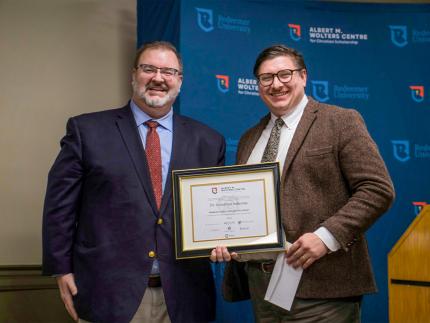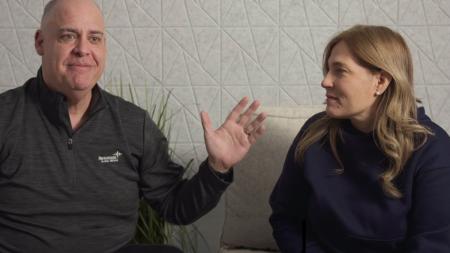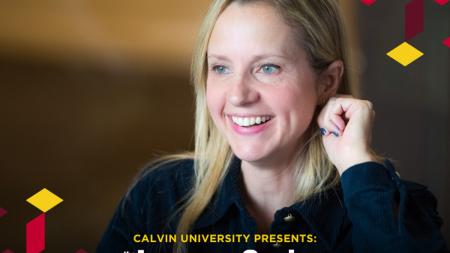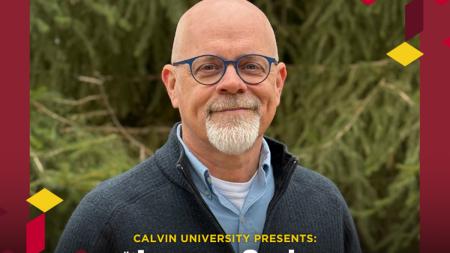Jonathan Askonas on Christian Political Theology

Dr. Jonathan Askonas spoke on Christian political theology while he was at Redeemer University to accept the Emerging Public Intellectual Award. The presentation on Wednesday, Jan. 29, was part of The World and Our Calling Lectures series at Redeemer.
In his talk, titled “Christ or Barabbas? Christian Political Theology in Post-Christian Society,” Askonas noted that to be a Christian in Western society today is to ask, implicitly or explicitly, how Christians should relate to an increasingly post-Christian society, which was shaped by a Christian heritage but which is now somewhat antagonistic to Christian faith.
The real question might be how Christians should relate to a post-Christian state, he suggested, since Christians generally get along well with their neighbors and communities, but the state sometimes makes demands on Christians that may be contrary to Christian values.
Some societies, he said, seek to be neutral, where Christians and others are free to worship and practice their faith or lack of faith. But while this can be a beneficial situation, there are problems with it. The choice to opt out of the public sphere runs contrary to our faith itself, explained Askonas. Another problem is that this situation is not sustainable. The theology of two swords that never cross – spiritual power and temporal power – means something different, Askonas suggested, when those powers are wielded by institutions that oppose and attack each other.
Quoting Bonhoeffer, Askonas observed that “Luther’s doctrine of the two kingdoms was misinterpreted as applying the emancipation and sanctification of the world and of the natural; government, reason, economics, and culture arrogate to themselves a right of autonomy, but do not in any way understand this autonomy as bringing them into opposition to Christianity.” Bonhoeffer had seen this conflict come into play when the Nazis used the separation of faith and culture against churches who stood against the rising Nationalsozialist regime.
An alternative to the idea of Christians staying neutral in the public square is Christian Nationalism, said Askonas. This involves Christians proactively reclaiming the public square for Christ. “The one obvious problem with this is that, except perhaps in its most spiritually focused forms, this presumes a reclamation of the temporal sword – perhaps reclamation by force – and a contestation for power, a turning of Christianity into a kind of political faction within the state that could then take over the state,” Askonas observed.
Neither of these options seems to reflect political theology that we see in history, he said, so we may be missing something.
“I want to contend tonight that there’s a third option,” said Askonas. And to describe that option, Askonas introduced listeners to a debate from the 1930s between two scholars: Carl Schmitt, a German jurist, political theorist, and Nazi; and Erik Peterson, a Swedish Catholic theologian and historian.
Schmitt argued, said Askonas, that political theories are actually secularized versions of theological concepts: our ideas about God are our ideas about power and the use of power. Even after the dissipation of religious belief, those concepts survive, he argued.
This seems true in the world today, observed Askonas. “It seems quite obvious that, for example, our ideas about human rights, our ideas about sovereignty, our ideas about equality, our ideas about freedom have distinctly Christian origins but that those concepts have survived even into a kind of post-Christian society.”
Schmitt discussed what it means to be political, or to be politicized. Bathrooms, for example, noted Askonas, didn’t used to be political, but now they are. That’s partly because the government has gotten involved in regulating them, but there is more to it. Schmitt argued that the essence of the political is the friend-enemy distinction: the way we decide as a group who is in and who is out of our group. This distinction is made around a way of life: religious beliefs, values, habits.
Askonas explained, “Our decisions about our way of life and the things that threaten it are what render something political or not; something becomes politicized when there is an underlying threat to our way of life.” Significant in Schmitt’s theory is that the final evidence of the political nature of something is people’s willingness to fight and die to defend it, said Askonas.
Erik Peterson, who was a former friend of and correspondent with Schmitt, saw dangerous implications in Schmitt’s theories, including support for authoritarianism. Schmitt saw in the parliamentary democracy of the Weimar Republic that preceded the Nazi regime an inability to make decisions and get things done. An authoritarian regime with a strong leader could take decisive action, he claimed. The rising regime that ended up taking decisive action in Germany from 1933 to 1945 was the Nationalsozialist (Nazi) Party.
Peterson wrote criticisms of Schmitt’s theories, including an essay in which he argued that the sovereignty and unity of command that Schmitt associated with Christian political theology is not Christian. The “divine monarchy” idea came from classic antiquity.
Rather, Peterson argued that the reality of the Trinity doesn’t allow for Christian political theory because a human monarch can’t attain the rulership of a triune God. In addition, argued Peterson, Christianity survived, and to some extent led to the demise of the Roman Empire, which it should not have if Schmitt’s theories were correct.
Askonas suggested two problems that he sees with these critiques. The first is that Peterson tries to prove too much; when we speak of God’s sovereign will, it is not the same as a human sovereign’s will, but that doesn’t prevent us from making an analogy. Schmitt also later argued that God’s triune nature doesn’t affect the idea of one sovereign holding power and making decisions.
Another critique of Peterson’s arguments is that he selectively chose examples to prove his point; contrary to his way of reasoning, there are examples of thinking of Christ’s kingship in political terms in the writings of orthodox theologians.
A more esoteric problem, says Askonas, is that Schmitt’s teaching is eschatological – shaped by a Christian view of history ending in the kingship of Christ. The final enemy, in his view, is antichrist. Political actions that Christians might take are participating in a history leading to the kingship of Christ. He noted that empires have defended against chaos and anarchy. “Schmitt, who saw himself as supporting causes opposing the forces of antichrist was, in fact, as he later admitted, a hastener against his will: the regimes which he supported actually furthered these developments within history,” explained Askonas.
Askonas also suggested that Peterson had an argument to which Schmitt had no response. Schmitt had asserted that a willingness to fight and die for something – a way of life – made that thing political. Some elements of a relationship between Christians and violence include Just War Theory and the Crusades, but another element is martyrdom.
Schmitt made a distinction between martyrdom and political violence, saying that the church can exhort a believer to martyrdom, but only for his own soul and not for the political gain of the church. Peterson argued that martyrdom has nothing to do with the believer’s own soul, but that it involves Christians being called before political power – judges, political leaders, and others – and testifying publicly to the truth of the gospel. The prime example of this, he explained, is Christ’s trial before Pontius Pilate.
Peterson contended that much of the symbolism in John’s book of Revelation corresponds to symbols and titles of power in the Roman Empire. In the early church context in which John wrote, “The political trial [of Christ and later of his followers] is a confrontation as it were between the state and the kinds of authority claims that it makes and the church and the kinds of authority claims that it makes – most specifically, the claim of the authority of the rightful kingship of Jesus Christ,” explained Askonas. Christ rightfully took on himself titles that Caesar Augustus had claimed, such as the prince of peace and the one Lord over all lords; Christ’s trial was a confrontation between rival claims.
Noting the religious authorities’ claim to Pilate saying “We have no king but Caesar” (John 19:15), and the people’s determination to crucify Christ, Peterson noted that neither the Jewish leaders, nor the monarch’s representative, nor the people understood the kingdom of God, said Askonas.
In response to pressure from the religious leaders and the people, Pilate released Barabbas, who was likely a zealot and rejected the idea of Caesar as king. In releasing him, Peterson argued, Pilate violated his obligation as a Roman. The Roman Empire thus sought to establish peace at the cost of truth. Jesus says he is a witness to the truth, and that his kingdom is and will be established.
Christ told his disciples they would also be brought before magistrates and that they would witness and be persecuted or killed (Matt. 10:16-20; Luke 21:12-13). The church is an embassy of God’s kingdom coming in history.
In a state where political claims on people are few and relate primarily to justice and public safety, it can be easy to hold a neutral, personal view of Christianity in society. However, said Askonas, when the state grows and begins to encroach on the autonomy of the church, making more and bigger claims over society and human beings, conflict becomes inevitable.
In both Peterson’s and Schmitt’s theologies, said Askonas, “we find a political theology which is historical, which is informed by the Incarnation, which is political in that it doesn't shy away from the need to decide something concretely, which is willing to defend one's way of life to the point of dying, and which is eschatological, which also opposes the idea of religion as a private matter or the withdrawal of the church from the public sphere in the face of physical domination, that still maintains its willingness to proclaim the kingship of Christ but does so not through a kind of forceful overtaking of the state but by a proclamation in the here and now of the kingdom of God.”
Today, argued Askonas, we are again faced with the choice between Christ and Barabbas. Schmitt, seeking to use political violence to restrain political violence, is on the side of Barabbas. The state is at home with this language; it knows what to do with political violence. But “those who seek to wield political violence to overthrow an entity which thrives on political violence stand no chance at all,” said Askonas.
Askonas suggested that when Christ advised Peter to put away his sword, he wasn’t saying there wasn’t a cause to fight for. He was saying that the empire knew how to fight that way. The empire didn’t understand the way of sacrifice, the way of Christ’s death and resurrection. The way of Christ is to take up the cross, not the sword, said Askonas.
This eschewing of political violence is not weakness, said Askonas; in some ways the Christian way requires more courage, as we bear witness to Christ’s kingship. “In our own lives,” he said, “in our society today, in the West, in the United States, in Canada, to a degree not seen, I would argue, since the Roman Empire, we face a state that is universalizing and totalizing claims over over our bodies, over the human species, over life and death, over the kinds of practices of worship we are and are not allowed.” Christianity also makes claims over all of humanity, but in a very different direction, said Askonas. In these circumstances, he suggested, we will come into confrontation with the state. We won’t win by political violence but by bearing witness to the truth.
In conclusion, Askonas reflected, “I think it's undeniable, as we move into a post-Christian society, with a state that makes these kinds of universal claims, we are in new territory. But I hope that we'll have the courage to draw from the inspiration of the early church and from the work of Erik Peterson to take a stand for the kingdom of God, to eschew political violence but not to eschew our hope in the resurrection.”


